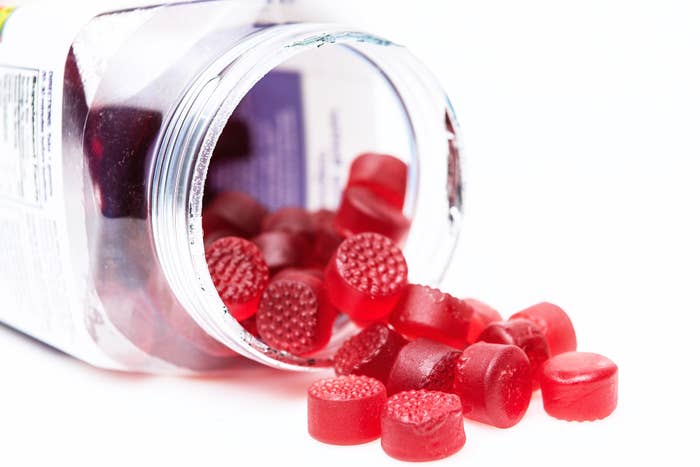
It’s not easy to get good sleep, especially during a worrisome pandemic with no end in sight, so it’s not surprising that bottles of sleep-inducing melatonin pills have become bedside staples.
But this increased availability of melatonin at home, particularly in easy-to-consume forms like gummies, has had serious, and in some cases deadly, consequences for the children who either accidentally get their hands on it or are given it by a caregiver.
A new study published by the CDC found that melatonin overdoses in children increased 530% from 2012 to 2021, with the largest spike — a 38% increase — occurring from 2019 to 2020, when the COVID pandemic started. The researchers looked at melatonin overdoses in children and teens.
More than 260,000 cases were reported to US poison control centers over the last decade, including more than 4,000 hospitalizations and nearly 300 that resulted in intensive care.
Five children required mechanical ventilation and two children — a 3-month-old and a 1-year-old — died at home following melatonin poisoning.
The researchers said child-resistant packaging for melatonin “should be considered” and that healthcare providers need to better warn parents about the supplement’s “potential toxic consequences.”
The study’s lead researcher Dr. Karima Lelak, who is a pediatric emergency medicine physician at the Children's Hospital of Michigan in Detroit, said melatonin may not be as harmless as people make it out to be, and that safe storage is absolutely critical.
“Parents should really see melatonin just as any other medication that has the potential to do harm to kids, and it can be even more dangerous because it can look like candy,” Lelak told BuzzFeed News. “If a parent takes their melatonin after reading this paper and puts it in their medicine cabinet, I am humbled because I think that's really a big take-home point: safe storage.”
Melatonin supplements work by mimicking melatonin, a hormone naturally found in our bodies that is produced by the brain in response to darkness. Supplements are mostly used to treat sleep disorders, but they’re an accessible over-the-counter product anyone can buy and use to help improve sleep (and they’re often promoted to parents as a sleep aid for children).
Melatonin is regulated by the FDA as a dietary supplement, requires no prescription to take, and is widely available in pill, liquid, and gummy form.
The majority of melatonin overdoses were accidental, occurred at home, and were treated in a setting outside of healthcare, the researchers found; most involved boys younger than 5.
Melatonin consumption comprised about 5% of all childhood overdoses reported to poison control centers in 2021, compared with 0.6% in 2012, the study found. The supplement was the most frequently consumed substance among kids reported to poison control centers in 2020, likely because children were spending more time at home due to pandemic-related school closures and stay-at-home orders.
The 10-year study also showed that melatonin ingestions are leading to more serious outcomes over time. Whereas most hospitalized patients involved teenagers who may have intentionally taken too much of the hormone, the biggest jump in hospital admissions occurred among kids younger than 5 who accidentally overdosed on melatonin.
It’s still unclear why the severity of melatonin ingestions among kids is getting worse, but the researchers speculate that quality control issues with the supplements themselves may play a role.
Melatonin sales in the US surged 150% between 2016 and 2020 in response to public demand.
Studies conducted in Canada have shown that melatonin sold in stores often fails to match some of its label’s claims in terms of dosage, with the most variation found in the chewable products that kids are more likely to consume.
This research has led to some important changes in Canada’s health policies involving melatonin, including the banning of certain over-the-counter products. However, such “drug quality studies and legislation initiatives in the United States are lacking,” the researchers wrote.
What’s more, these studies have found that some melatonin products are often contaminated with “potentially clinically significant” doses of serotonin, a byproduct of melatonin, that can lead to serotonin toxicity in kids, causing symptoms such as confusion, high blood pressure, overactive reflexes, and a rapid heartbeat.
Most of the children included in the study who accidentally consumed too much melatonin didn’t have any symptoms, but those who did had gastrointestinal, cardiovascular, or central nervous system issues, including nausea, drowsiness, abdominal pain, and vomiting, Lelak said.
It’s difficult to know how much melatonin is too much because there isn’t an established dosage deemed safe for consumption, according to Lelak. It could be one pill or an entire bottle, but it will depend on how old someone is, the symptoms they’re showing after ingestion (if any), and their body size.
About 15% to 25% of children and adolescents have trouble falling and staying asleep, according to the American Academy of Pediatrics. However, the group warns, parents should speak with their pediatrician before giving their kids melatonin.
Dr. Shalini Paruthi, a spokesperson for the American Academy of Sleep Medicine, previously told BuzzFeed News that parents should wait until their kids are at least 3 years old before giving them melatonin because children younger than that have “unformed neurological and endocrine systems.”
It’s also a good idea to first address poor sleep behaviors to ensure kids are getting quality sleep.
If you suspect your child has consumed melatonin, Lelak said you should immediately call poison control, especially if you don’t know how much they ingested. (Poison control can be reached at 1-800-222-1222.) Experts on the line will help guide you in the event your child is showing symptoms and determine if a visit to the hospital is warranted.
And most importantly, store your melatonin where it’s out of reach for a child, like in a locked storage box, she added.
UPDATE
This post has been updated to include a link to the website for the American Association of Poison Control Centers.
